DAMSEL (2024)
A dutiful damsel agrees to marry a handsome prince, only to find the royal family has recruited her as a sacrifice to repay an ancient debt.
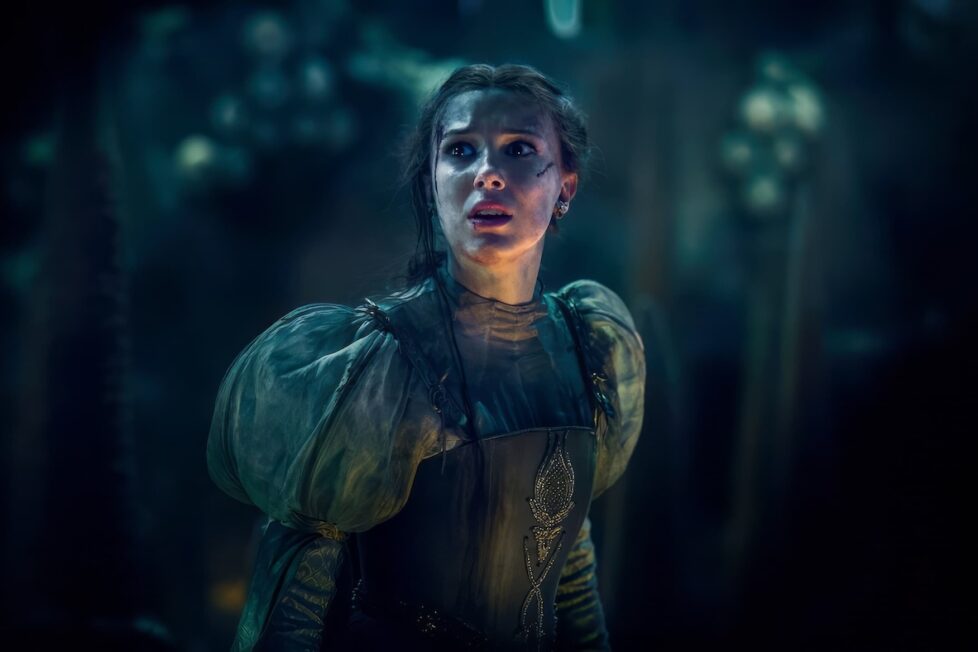
A dutiful damsel agrees to marry a handsome prince, only to find the royal family has recruited her as a sacrifice to repay an ancient debt.


Reviewing films that are almost exquisitely not to one’s taste can be difficult, and that’s what I thought the task with Damsel would be. However, it turned out to be somewhat more enjoyable than that. Not vastly more so, but enough, I suppose, to prevent it from being unbearable or even truly bad.
Damsel concerns Elodie (Millie Bobby Brown), an eligible princess of a barren kingdom whose father, Lord Bayford (Ray Winstone, sounding more like one of the pearly kings and queens of London lore), bequeaths her hand in marriage to the wealthy rulers of another land. Her husband will be Prince Henry (Nick Robinson), son of Queen Isabelle (a gorgeously glacial Robin Wright), but rather than the traditional consummation, their wedding is succeeded by a ceremony wherein Elodie is plunged into darkness, where a dragon awaits…
The film doesn’t get off to a promising start. Over a black screen, Brown intones that this isn’t your typical fairy tale about a damsel in distress. In this one—gasp!—the damsel will have to save herself. This kind of genre reinterpretation through a fourth-wave feminist lens is what I’ve come to associate with Millie Bobby Brown, following both Enola Holmes films (2020, 2022). While they doubtless serve a purpose for young girls who are probably playing on their smartphones as the movie runs anyway, works in this new genre tend to leave me cold.
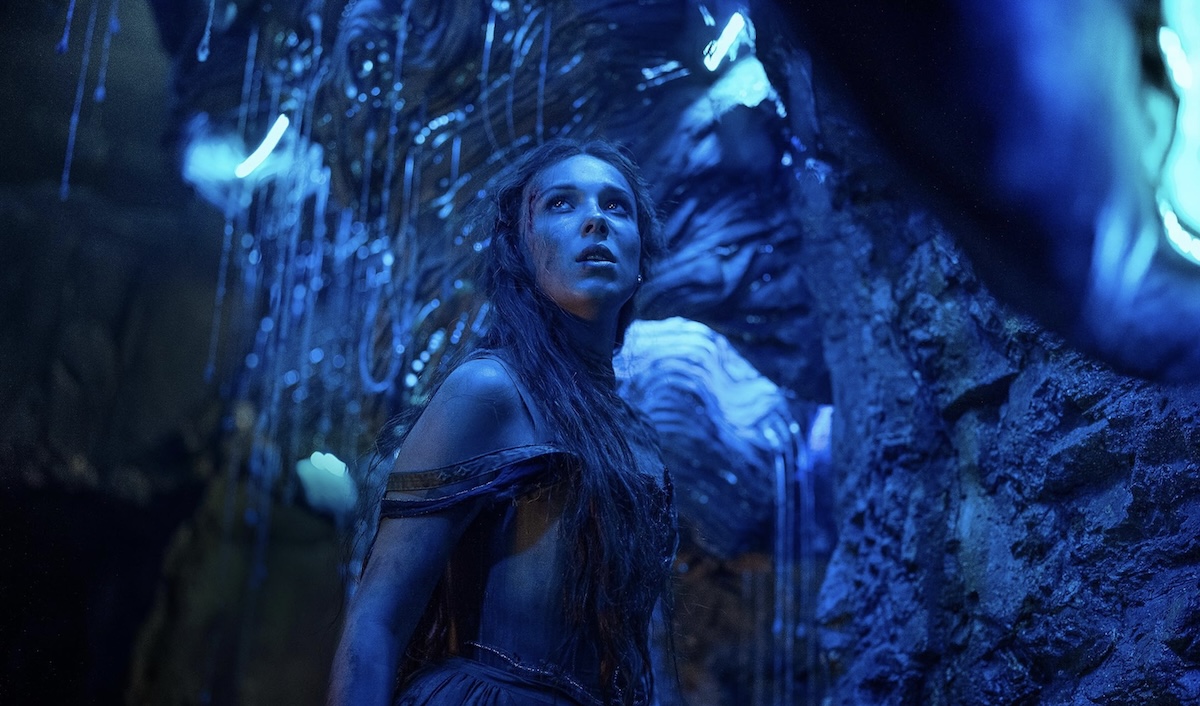
Of course, we need more stories featuring strong female characters. However, is this need best served by films that shout at us, “THIS IS ABOUT A POWERFUL WOMAN, YOU GUYS, NOT LIKE ALL THOSE OLD STORIES YOU’VE BEEN TOLD” time and time again? I feel as though strong female characters should simply be that. While remarking on tropes is perfectly acceptable, it doesn’t necessarily butter the onions.
We meet Elodie chopping wood, scorning her sister for even considering such fripperies as pretty clothes while the people of the kingdom are starving. She practically declares she’s “not like the other girls.” What’s more, everyone speaks in what feels like a forced and exaggerated “fantasy” voice, as if they’re reciting Shakespeare in a school play. Wright’s performance was the only one that stood out for me. She has a powerful, Vanessa Redgrave-esque quality, and feels like a genuine monarch. The kind who offers a warm welcome and friendship, but get too close and the claws come out. Her icy, aloof exterior has been honed by years of refined upper-class manners. Beneath her unwavering gaze lies ice as unyielding as stone.
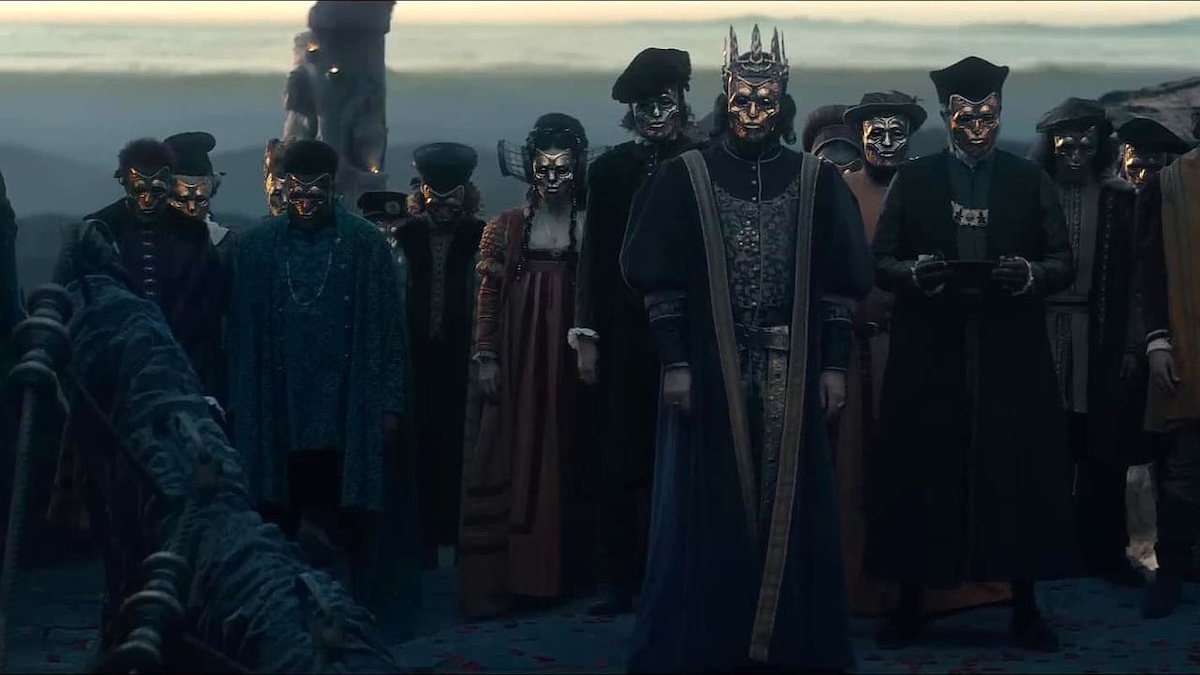
The vistas are pure CGI. Yet, despite living in an age where television often resembles film, with visuals just as stunning and meticulously crafted, the “TV movie” remains very much alive and kicking. Damsel exemplifies this format in its current state. On the big screen, it would appear hopelessly low-budget, and even the story’s stakes feel rather small-scale (one princess in a generic cat-and-mouse game with a dragon). However, it fits the dimensions of a TV screen quite well, particularly since you haven’t left the house or paid cinema prices to see it.
The dragon is voiced by Shohreh Aghdashloo, and in a spin on the tropes that I do rather like in execution here, we learn something about her motivations and see her story end in a relatively atypical way. It’s not groundbreaking, but it’s fun for its length at Damsel’s 110-minutes, which is about 20 minutes too long for a film like this (Roger Corman’s “90 minutes and one scene in a strip club” rule for B-movies comes to mind), but not painfully so.
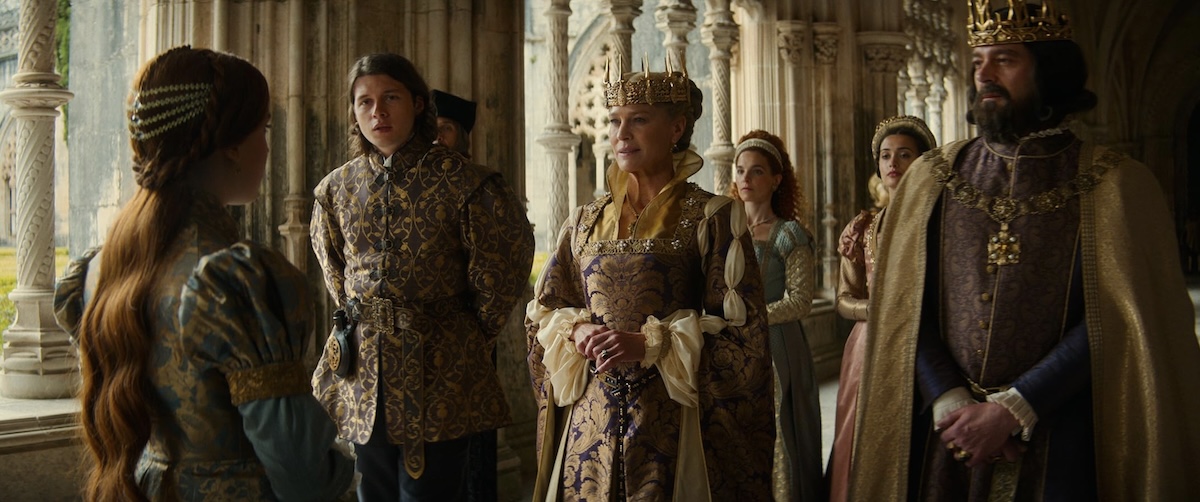
This is a film where the acting’s hard to judge with any nuance because it’s all so mannered and artificial. That’s why Robin Wright’s uber-bitch stands out, and Ray Winstone’s “cor blimey, guv’nor, King Arthur Daley, ”’s aw’ ‘wight” impression. They’re giving character performances, perhaps understanding better than any of their colleagues in front of the camera that they’re essentially in a pantomime.
Millie Bobby Brown is competent, however, as is Brooke Carter as her coltish little sister Floria and Angela Bassett as her practical though kind stepmother. Another twist that I liked was the subversion of the typical “wicked” stepmother trope; here, she’s loving and wise. Brown doesn’t set the screen alight, but it would be highly unlikely for anyone to with this script. One thing I did find amusing was her character’s remarkable resistance to serious injury. This is one of those fantasy films where the heroine is thrown from great heights, tortured with a dragon’s claw, and flung about a cave, yet trots away each time with little that a bath, shampoo, and restyle won’t cure.
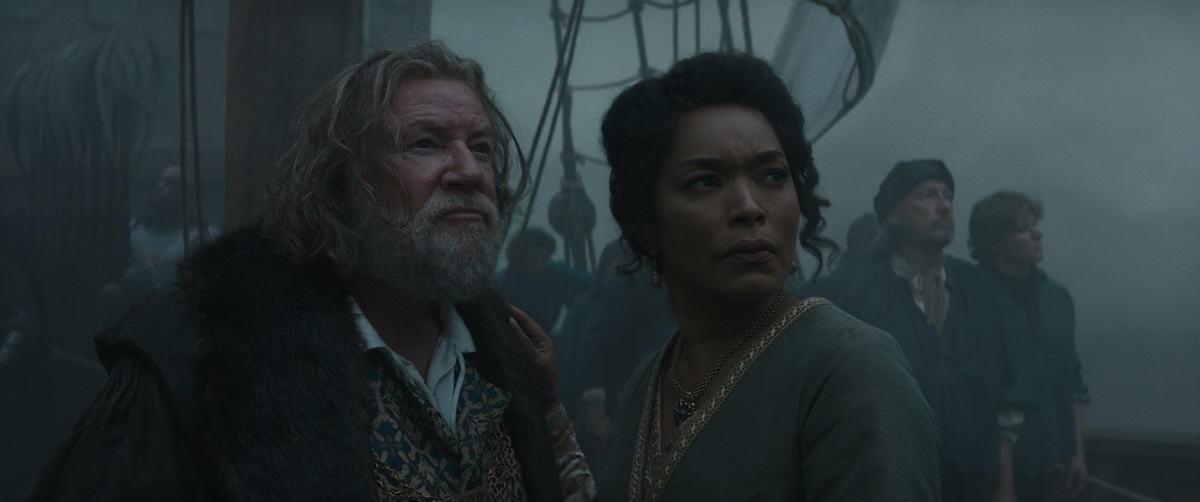
One could argue that Damsel, in a sense, is a response to B-movie fantasies like the Deathstalker films (1983-1991), both Conan outings with Arnold Schwarzenegger (1982’s Conan the Barbarian and 1983’s Conan the Destroyer), and Red Sonja (1985). These films, largely belonging to the barbarian subgenre (discussed in a fun movie guide, Barbarians at the Gates of Hollywood: Sword and Sorcery Films by P.J Thorndyke), relied heavily on stereotypical depictions of sex and gender, even when their protagonists were women. (Metal bras and leather thongs became a heroine’s typical attire; I spent part of my childhood wishing that heroes wore the same!)
Those films were certainly problematic, using a pseudo-medievalist aesthetic as an excuse for depicting the exploitation and assault of women. (“Hey, that’s just how it was back then,” you can imagine someone excusing it, even though sword fights with dragons probably weren’t a common occurrence either.) Nonetheless, I’d rank your Deathstalkers and the like as more entertaining than Damsel, simply because they offered a greater sense of adventure and a developed world, making you feel like you’re in a specific fictional place. Damsel‘s CGI battlements and caverns lack this appeal, and the constant references to genre conventions throughout do little to create the illusion of a believable world.
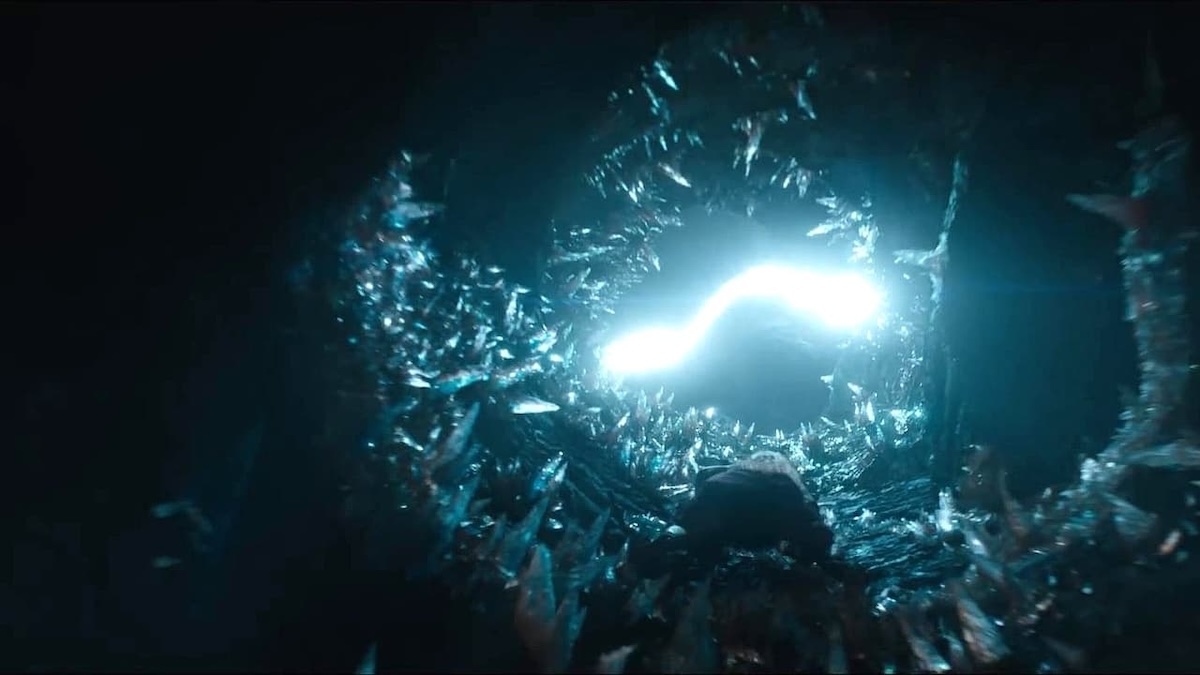
Even so, what I find more entertaining, as a grumpy old English student, is beside the point. Damsel serves its purpose and will be appreciated by fans of Bobby Brown who enjoy fantasies of wealth and power—of being a princess, but with the guilt-alleviating additions of social conscience (Elodie caring for her kingdom’s disadvantaged citizens), personal defiance, and physical prowess. In Damsel, she doesn’t even have to earn these things through the favour of an eligible suitor’s attraction to her. Ideally, one day the film itself won’t need to constantly comment on this, and the heroine’s strength will be taken for granted. For now, however, this will do.
For those who aren’t members of the Millie Bobby Brown fan club, whose bookshelves aren’t overflowing with “dark romance” and YA dystopian novels, and who don’t multitask by watching movies while scrolling through Instagram, there are still some ancillary pleasures to be found: the mature acting triumvirate of Wright, Winstone, and Bassett, and a simple but pacy (if overlong) story with some twists and turns.
USA | 2024 | 110 MINUTES | 2.39:1 | COLOUR | ENGLISH

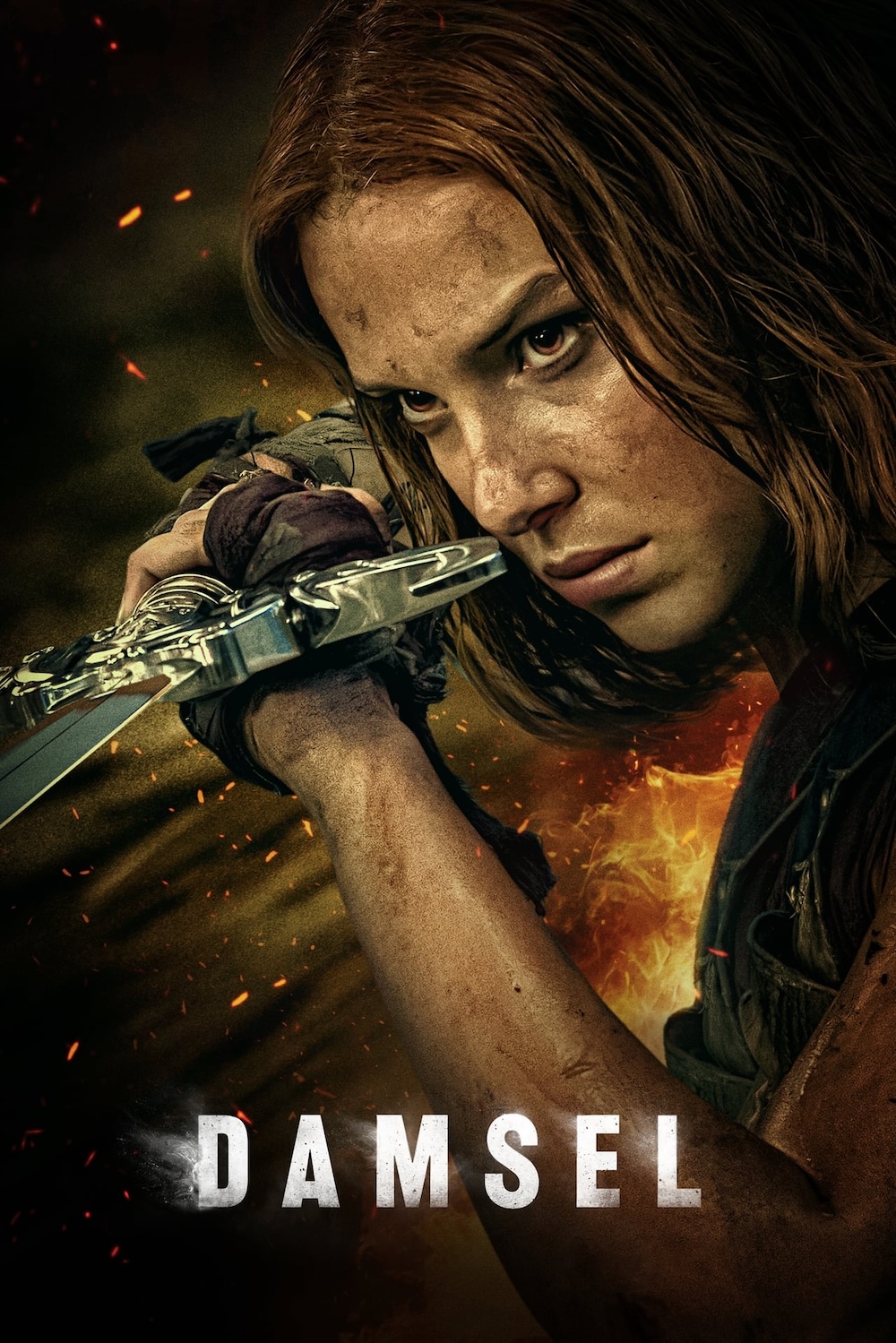
director: Juan Carlos Fresnadillo.
writer: Dan Mazeau.
starring: Millie Bobby Brown, Ray Winstone, Nick Robinson, Shohreh Aghdashloo (voice), Angela Bassett & Robin Wright.
